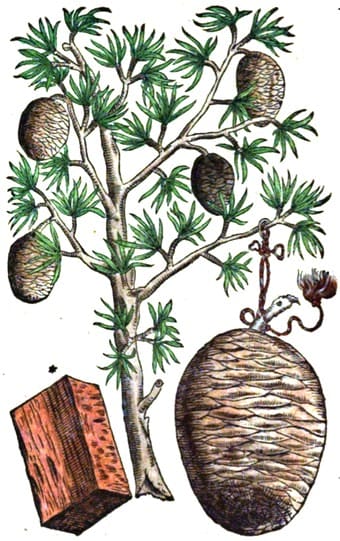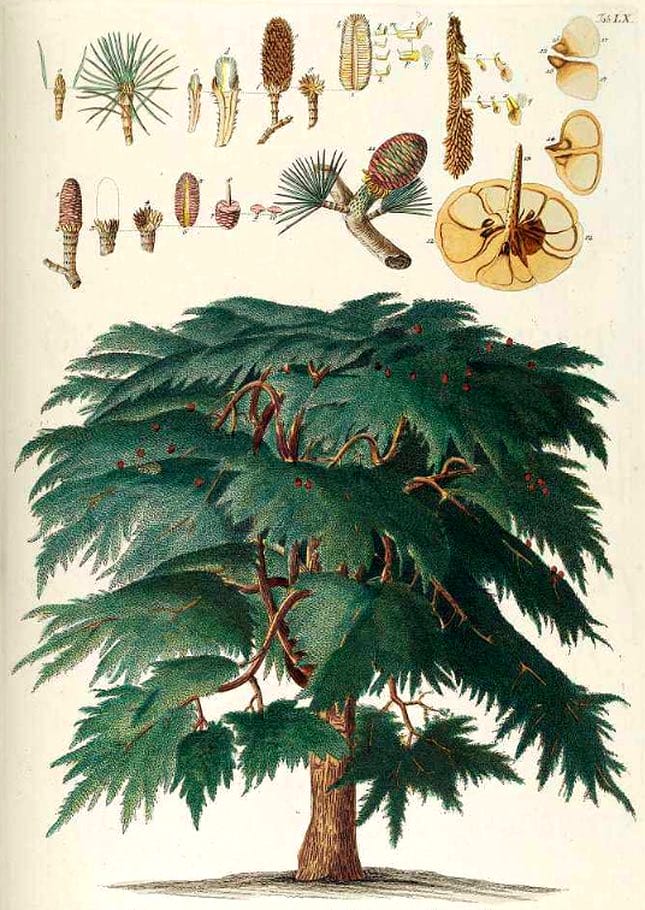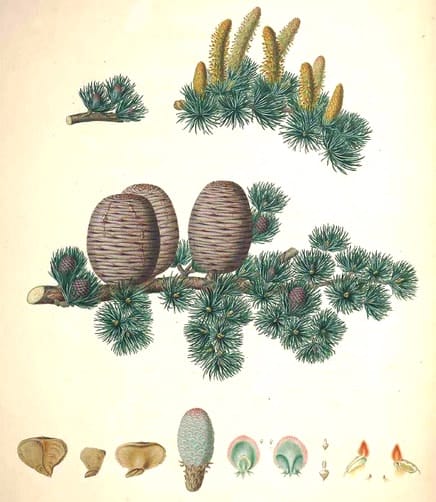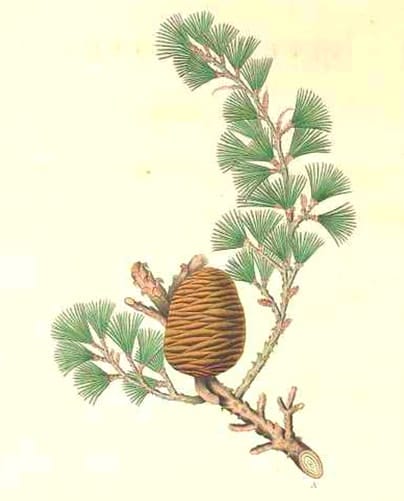Cedrus, CedarLibani, Cedrus Magna (C. libani)Devadaru (C. deodara, Ayurveda) Devadhari (C. deodara, Siddha) Sidr (C. libani, Unani) Deodaar (C. deodara, Unani) Xue Song (C. deodara, TCM) Thang Shing ཐང་ཤིང༌ (C. deodara, Tibetan) |

|
 Cedrus libani
Cedrus libaniKreutterbuch, Matthiolus, 1586
 Cedrus libani
Cedrus libaniC.J. Trew, G.D. Ehret, Plantae selectae, vol. 6 (1760)

|

|
A.B. Lambert, Description of the genus Pinus and some other remarkable plants, 2nd ed., (1890)
 Members CLICK HERE for the PRO VERSION
Members CLICK HERE for the PRO VERSIONBotanical name:
Cedrus spp. (syn. Pinus cedrus)
There are three main varieties of Cedar, all used very similarly:
1. C. libani (Cedar of Lebanon)
2. C. deodara (syn. C. libani var. deodara) (Indian Cedar)
3. C. atlantica (African Cedar)
The classical medicine ‘Libani‘ has been said to have been derived by both C. libani and C. deodara, according to different sources.
Parts used:
Leaf; Wood; Resin; Libanol (essential oil from the wood and needles)
Libani, in classical western formula, usually refers to the gum-resin.
Cedria: liquid resin of the tree
Devadaru in Ayurvedic texts refers to the Heart wood.
Temperature & Taste:
Warm, dry. Bitter, Pungent
Resin is hot and dry.
Uses:
1. Clears Cold Phlegm, Stops Cough: (TCM, West)
-Cough, Bronchitis
2. Clears Wind-Damp, Promotes Urine: (Wood; Leaf; Resin; Fruit; TCM, Ayurveda, West)
-Edema, Strangury
3. Warms the Stomach, Clears Damp, Regulates Qi:
-flatulence, Colic
4. Stops Bleeding, Clears Stasis: (TCM; Leaf, Wood)
-Diarrhea, Dysentery
5. Kills Worms:
-Worm infestation
6. Externally:
-Rash, Dermatitis, Itching
Dose:
Heart Wood in Powder: 3–6 grams
Comment:
… available in PRO version
Substitutes:
… available in PRO version

Main Combinations:
1. Catarrh from Cold:
i. Libani gum, … available in PRO version
ii. Libani gum, … available in PRO version
2. Cough and Breathlessness from Cold Phlegm obstruction:
i. Cedrus Devadaru (wood) with … available in PRO version
ii. from Lung deficiency, Libani, … available in PRO version
iii. Libani, … available in PRO version
iv. Cedrus Devadaru (wood), … available in PRO version
3. Indigestion, Bloating, Cedrus Devadaru (wood) with … available in PRO version
4. Diarrhea, Libanum bark, … available in PRO version
5. Edema, Stones, Kidney diseases, Pleurisy, Libani, … available in PRO version
6. Acne, Eczema, Itching, Cedrus Devadaru (wood) with … available in PRO version
7. Muscular Cramps, Spasms, Cedrus Devadaru (wood) with … available in PRO version
8. Arthritis, Lumbago, Rheumatoid Arthritis, stiffness of the body:
i. Cedrus Devadaru (wood) with … available in PRO version
ii. make an oil of Cedrus Devadaru (wood) with … available in PRO version
iii. make an oil of Cedrus Devadaru (wood) with … available in PRO version
9. Tremors, Libani gum, … available in PRO version
10. Goiter, Cedrus Devadaru (wood) with … available in PRO version
11. Headache from Wind, Cedrus Devadaru (wood) with … available in PRO version
12. Tinnitus, Decoction of Hyssop with Libanum resin … available in PRO version
13. Plaster for Pain and Tumors from Blood stagnation, Libani, … available in PRO version
Major Formulas:
Confection for Catarrh (Mesue)
Expert Confection for Tremors
Troches to Strengthen the Lungs (Mesue)
Powder for Chronic Diarrhea of Nicholas
Antidotum Asclepiadus Minus (Nicholas)
Mahasudarsana Churna
Devadrumadi Churna
Mandor-Vataka
Indukanta Ghirta
Yogaraja Guggulu
Cautions:
1. Not used in strong Heat conditions.
2. Avoid during pregnancy. The resin ‘Kills the living child in the mothers body’. (Parkinson)
3. Hildegard said if Cedar is taken by one in health it will make the body hard and rigid.
Main Preparations used:
-
Extra Info
-
History
|
Cedar of Lebanon is said to be the wood used to build Solomans Temple and the Hanging Gardens of Babylon. It has been used for thousands of years as incense, in embalming, and in perfumery. The resin was classically known as the ‘Life of the |
Dead‘ because it preserved dead bodies from rotting. Himalayan Cedar (C. deodara) is important in Indian culture and in Ayurveda. It is called ‘Wood of the Gods‘. |
